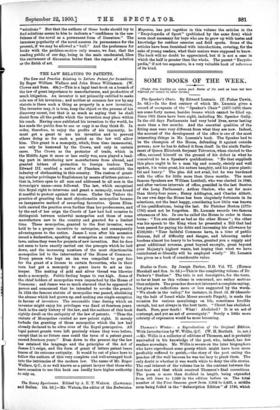SOME BOOKS OF THE WEEK
[Under this heading we notice such Books of the week as have not been reserved for review in other forms.] The Speaker's Chair. By Edward Lummis. (T. Fisher 17nwin. 2s. 6d.) —In the first century of which Mr. Lummis gives a record of occupants of the "Speaker's Chair" (1377-1478) there are some forty names, besides lacun.-e which cannot be filled up. Since 1801 there have been eight, including Mr. Speaker Gully. In the old days Parliaments had very brief lives, never lasting more than a few months. And the essential qualities of the fitting man were very different from what they are now. Indeed, the account of the development of the office is one of the most interesting things in Mr. Lummis's book. The Speaker had to be the champion of the House, defending it against outside powers ; now he has to defend it from itself. In the ninth Parlia- ment of Queen Elizabeth Serjeant Yelverton, when elected to the office, excused himself on the ground of his defect in what he conceived to be a Speaker's qualifications. "He that supplieth this place ought to be a man big and comely, stately and well spoken, his voice great, his nature haughty, and his purse plenti- ful and heavy." The plea did not avail, but he was burdened with the office for little more than three months. The most famous Speakers are William Lenthall, who was elected in 1640, and after various intervals of office, presided in the last Session of the Long Parliament ; Arthur Onslow, who sat for more than thirty-four years ; Henry Addington, and Charles Abbott. In our own days the House has been singularly fortunate in its selections, not the least happy, considering how little was known of his qualifications, being the last. Sir Fletcher Norton (1770- 1780) must not be forgotten. Mr. Lnmmis records two famous utterances of his. In one he called the House to order in these terms : "You are almost as bad as the other House" ; the other was his speech to the King when he presented a Bill that had been passed for paying his debts and increasing his allowance by £100,000: "Your faithful Commons have, in a time of public distress, full of difficulty and danger, and labouring under burdens almost too heavy to be borne, granted you a supply and great additional revenue, great beyond example, great beyond your Majesty's highest wants, but hoping that what we have contributed so liberally will be employed wisely." Mr. Lummis has given us a book of considerable value.






































 Previous page
Previous page